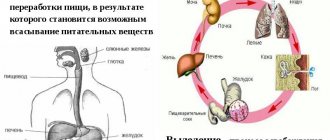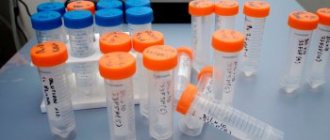Why does your stomach hurt during pregnancy?
During this period, from time to time the woman feels pain or discomfort in various parts of the body. As a rule, they indicate changes in hormonal levels or are associated with abdominal growth. But sometimes abdominal pain indicates an exacerbation of previously dormant diseases or the emergence of other problems.
The abdomen does not belong to a single organ; pain in this area can be associated with pathologies in various body systems. If you experience any unpleasant painful sensations, it is best to consult a doctor.
Pathological pain accompanying pregnancy
But in the early stages of gestation, abdominal pain can also be of a threatening nature for its further development. During the first trimester of pregnancy, it is possible to diagnose:
- Frozen pregnancy. The condition is characterized by arrest of fetal development and death. Natural abortion of the fetus occurs, which is accompanied by painful cramps in the lower abdomen.
- Ectopic pregnancy. The attachment and development of the fertilized egg occurs in the cavity of the fallopian tube. If its diameter is exceeded, a rupture occurs, which is accompanied by severe painful syndrome.
- Threats of abortion. Sometimes the stomach hurts in the first weeks of pregnancy when there is a threat of spontaneous termination of gestation. In this case, detachment of the ovum occurs, accompanied not only by pain, but also by the presence of bloody discharge. They can present as light spotting or full-blown bleeding. The strength of the pain may also vary. Treatment started on time in certain cases can save the fetus.
- Corpus luteum cysts. The corpus luteum is used to support pregnancy at the beginning of its development. Its task is to produce progesterone until the formation of the placenta is complete. The formation of a cyst is accompanied by nagging pain. The cyst does not require treatment, but can rupture as a result of significant physical exertion. Sexual contact can cause a violation of integrity. The symptoms are quite specific - severe pain, profuse internal bleeding.
Pain in the lower abdomen in early pregnancy may indicate an incipient miscarriage
Types of abdominal pain and causes of their occurrence
Abdominal pain during pregnancy is conventionally divided into obstetric and non-obstetric. Obstetric pain includes pain that is directly related to bearing a child and, as a rule, does not require medical intervention. Non-obstetric pain can occur in all people and be a symptom of disease.
The most common non-threatening obstetric pains include the following:
- At 2-3 weeks of pregnancy, the fertilized egg is implanted into the wall of the uterus. This may be accompanied by a slight nagging pain.
- Moderate abdominal pain in the 1st trimester of pregnancy. It is caused by physical changes in the body associated with softening of tissues to support the uterus, as well as stretching of muscles. Pregnant women who have previously had painful menstruation often face this problem. The pain is sharp, but short-lived in the lower abdomen. They intensify with sudden movements and when lifting heavy objects. There is no need to treat them, the woman should just lie down and rest.
- In later stages, abdominal pain may occur due to the baby moving. Also in the 3rd trimester, nagging pain is associated with the growth of the uterus and tension of its muscles
- Digestive problems associated with pregnancy. Due to hormonal changes, a woman may suffer from constipation, dysbiosis and bloating, accompanied by painful sensations. The pain is nagging or aching and is accompanied by belching, nausea, vomiting or heartburn
- This problem usually appears in the second half of pregnancy and requires nutritional adjustments.
- Before childbirth, the pelvic bones diverge, which may be accompanied by slight aching pain in the abdomen
- Training contractions appear in the 3rd trimester of pregnancy. In this way, the body prepares for the upcoming birth. They do not cause a woman much discomfort and are harmless
It is important not to confuse false contractions with premature birth. If regular contractions occur, especially severely painful ones, you should urgently call an ambulance.
Diagnostic methods
Pregnancy is that period in a woman’s life when many examinations are completely contraindicated for her. The permitted research methods are ultrasound, CT or X-ray, but the latter are carried out only in particularly severe cases.
If the pregnancy proceeds without any complications, the following will be enough for the doctor to make a diagnosis and prescribe a course of treatment:
- collect anamnesis (information about the duration of painful sensations, location and nature of manifestation);
- read the conclusion of the specialist who examined the patient;
- palpate the pregnant woman's belly;
- review the results of urine and blood tests.
What measures to take for abdominal pain during pregnancy
As you can see, abdominal pain during pregnancy can occur for various reasons. Some of them can threaten the health of both the expectant mother and the child. During the normal course of pregnancy, there may be minor pain in the abdomen without dynamics. In this case, the body simply adapts to a new physical state.
You should not self-medicate abdominal pain during pregnancy, as you can harm yourself and your baby. It is best to consult your doctor first.
Physiological pain during pregnancy can be relieved by staying in the knee-elbow position for 10 minutes several times during the day. Taking a warm shower, chamomile tea or aromatic relaxing oils (rose, mint, jasmine, lavender) will also help. After your doctor's permission, you can drink a glass of mint infusion or lemon balm decoction at night. The product will help you relax, eliminate pain and fall asleep quickly.
For pain caused by digestive problems, normalizing your diet and including a large amount of fresh vegetables, fruits and dairy products in your diet will help. You need to try to stick to the regime and eat food at the same time every day. It is important to avoid fatty, fried and spicy foods.
In case of inflammatory processes in the body that cause abdominal pain, the woman is prescribed pregnancy-compatible antibiotics, as well as acceptable antispasmodics. If there is a threat of miscarriage, uterine hypertonicity and initial placental abruption, bed rest and sedatives are indicated. Antispasmodics, which also reduce the tone of the uterus, help relieve pain in the abdomen.
If surgical intervention is necessary, they try to postpone it until the end of pregnancy, relieving the symptoms of the pathology. In emergency cases, they try to resort to laparoscopy rather than strip surgery.
Signs of obstetric pathology
Abdominal pain in a pregnant woman primarily raises concerns about keeping the baby. Obstetric causes are leading, starting from the early stages of gestation.
Threat of interruption
In the early stages, when the woman is not yet aware of her new status, a nagging pain may appear, as before menstruation. But the bleeding in this case will be more abundant than usual. This is how a miscarriage manifests itself in the first weeks.
If a woman already knows about her pregnancy, then the first signs of a threat should alert her. Usually it all starts with a nagging pain in the lower abdomen. It can be cramping and gradually intensifies. Simultaneously with the transition to the stage of contractions, bloody discharge from the genital tract appears. Gradually they increase in size, and without medical help a miscarriage occurs.
In some cases, spotting appears simultaneously with pain. This indicates a miscarriage if the period did not exceed 22 weeks.
Termination of pregnancy after 22 and before 37 weeks is called premature birth. Symptoms develop similarly to the early terms. The aching pain in the lower abdomen gradually intensifies and turns into cramping. It radiates to the lower back, perineum. Later, as with the normal mechanism of childbirth, pushing joins the contractions, and a premature baby is born.
In a modern hospital, with proper management of premature birth, satisfactory condition of the fetus and the absence of serious pathologies or infections, it is possible to nurse in special incubators until full maturation.
Sometimes the fertilized egg does not descend into the uterine cavity, but attaches to the fallopian tube or ovary. There are no conditions for the full development of the fetus, so at a certain stage such a pregnancy is terminated. The embryo can leave the fallopian tube without causing harm (tubal abortion). But in some cases this occurs with rupture of the appendage and the development of abdominal bleeding.
First, the lower abdomen begins to “ache,” and after the appendage ruptures, the pain becomes acute. Bleeding is accompanied by additional symptoms:
- weakness;
- cold sweat;
- decreased blood pressure;
- tachycardia.
After some time, the symptoms of peritoneal irritation subside. This is a period of imaginary well-being, after which the symptoms only intensify.
Cervical pregnancy is especially dangerous. Vessels pass through the cervix, which are destroyed when the embryo attaches. The longer the period, the higher the risk of severe bleeding. There is only one treatment - removal of the uterus along with the cervix.
Placental abruption
This condition develops after 16 weeks, from the moment the placenta forms. Detachment can occur from the edge or from the center. In the first case, along with aching pain, there will be severe bleeding from the vagina. In the second, the leading symptom is pain, and blood will appear much later.
With partial detachment, if the bleeding can be stopped or the woman can give birth, the child remains alive. If it is full, even in a maternity hospital there is no time left to save the life of the fetus, since tens of seconds count.
Uterine rupture
This is a rare condition that occurs in the third trimester in women with a scar on the uterus (after a caesarean section or other organ surgery). The reason is the failure of the scar. Risk factors are multiple pregnancy, polyhydramnios and increased tone in the last stages.
In this case, a sharp, stabbing pain occurs, and massive bleeding leads to loss of consciousness and a drop in pressure. For the fetus, this usually ends in death, and for the mother, in most cases, the loss of an organ.
Pain in the lower abdomen can be either a pathology or a natural process. Doctors will help identify the exact cause of abdominal pain.
Physiological processes in a woman’s body can provoke pain symptoms:
- Natural processes occurring in the uterus during pregnancy provoke a rush of blood and increased circulatory processes;
- Another reason when the stomach begins to pull during pregnancy is the enlargement and stretching of the uterine ligaments. Discomfort may arise due to the fact that they cannot keep up with the rapidly increasing volume of the uterus.
Coping with pain when the source of its occurrence is natural processes in the body is much easier than otherwise. In order for the pain to go away, just lie down and rest, at this time all the muscles will relax and calm down.
Prevention of abdominal pain during pregnancy
The following recommendations will help reduce physiological pain during pregnancy:
- take walks in the fresh air more often;
- avoid overwork;
- for longer periods, wear a support bandage;
- do gymnastics for pregnant women;
- ensure a comfortable night's sleep.
The bandage should only be worn while lying down and should not be tightened too much.
Infectious diseases, stressful situations, injuries and sudden movements can provoke the risk of various pathologies, so it is better to avoid them. Timely consultation with a doctor, as well as compliance with all his recommendations, will help reduce the risk of atypical abdominal pain during pregnancy.
Stomach hurts during pregnancy - Video:
A special case
Sometimes during pregnancy, the lower abdomen feels tight due to the occurrence of acute conditions or exacerbation of certain chronic diseases. We are talking about appendicitis, pancreatitis, intestinal obstruction. Pain in the lower abdomen in such cases is of a specific nature: it increases and is accompanied by an increase in body temperature, nausea, and dizziness. In such cases, it is necessary to seek medical help as soon as possible and call an ambulance. In some cases, for example, with sudden inflammation of the appendix, surgical intervention may be required, which in 99% of cases does not harm the pregnancy.
Conclusion: if a nagging pain in the lower abdomen occurs during pregnancy, you should not look for the cause of its occurrence on your own. A consultation with a doctor will help relieve anxiety, and perhaps avoid serious complications.
Diagnosis and treatment
Prenatal bandage corset
https://www.youtube.com/watch?v=T0c2H6qx6oY
If a woman has complaints of intense pain in the lower abdomen in the last weeks of pregnancy, she should contact her gynecologist. He will examine the patient and determine whether there is cause for concern. If necessary, a number of studies are prescribed:
- Ultrasound;
- general urine analysis;
- cardiotocography (CTG);
- general blood analysis;
- bacteriological urine culture;
- vaginal flora smear.











